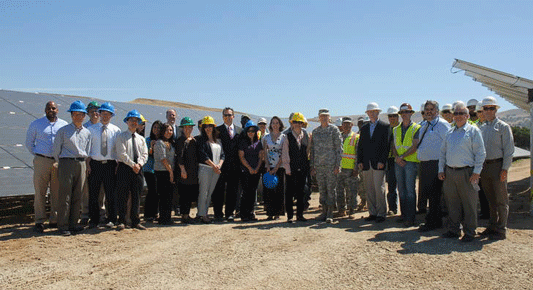- News
21 May 2012
Nanosolar completes installation of 1MW test-bed project at California’s largest National Guard training facility
Nanosolar Inc of San Jose, CA, USA, which makes thin-film photovoltaic cells and panels based on depositing copper indium gallium diselenide (CIGS) and nanoparticle inks on flexible aluminum foil substrates (using roll-to-roll solar cell printing), has completed a 1MW ground-mounted solar installation at Camp Roberts (the largest of California’s National Guard training facilities) in San Miguel, CA. Camp Roberts hosted a ribbon-cutting ceremony to mark energizing of the project on 11 May.

The installation is part of the US Department of Defense’s (DoD) Energy Security Technology Certification Program (ESTCP), which is testing various green technologies to identify viable solutions to address rising energy costs and minimize the reliance on fossil fuels. The DoD spends over $4bn annually on electricity use, accounting for more than 90% of the federal government’s energy use.
Nanosolar is contributing to the ESTCP program with its solar demonstration project at Camp Roberts, designed to show the effectiveness of using its CIGS utility panels. The installation, which consists of 4992 of Nanosolar’s panels, will be used to test the capabilities of the solution for producing energy in areas where solar irradiance is above average. At Camp Roberts, strong annual insolation of 1892kWh/m2 is typical. The project was installed in an area of flat, unused land.
“Our project at Camp Roberts shows how our technology can be used for both military and non-military applications, on a path to greater energy independence," says CEO Eugenia Corrales. “Nanosolar is on track to deliver the most cost-efficient solar electricity, with the expectation that we can achieve grid parity with non-renewable energy resources by 2015.”
Founded in 2002, Nanosolar uses what is claimed to be a unique high-throughput, roll-to-roll printing process to coat aluminum foil with proprietary CIGS inks, avoiding the use of vacuum deposition processes. It also has a metal wrap-through (MWT) back-contact design that enables it to produce cells more efficiently. Nanosolar claims that the design offers a panel with high mechanical and electrical stability, enabling easier installation at lower total cost. With manufacturing capacity of 115MW, the firm is currently producing 230W panels with 11.5% module efficiency and expects to be at 14% in 2013.
Nanosolar CIGS thin-film PV panels CIGS
